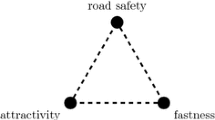Abstract
In this paper, we present an approach to generate pleasant running tours for unknown environments. We start from a first version, able to generate basic pleasant tours, but without explicitly catering for elevation. Based on observations on how runners appreciate elevation gain and steepness and on interviews with local runners, we identified corresponding additional needs. Indeed, runners usually have specific implicit or explicit objectives or limits with respect to the elevation gain they want to target or to avoid with a tour. In consequence, we extend our first approach. We expose the algorithm we have defined to address elevation constraints during tour generation and the underlying intuitions. An important differentiator with prior art is that we address elevation constraints during the tour generation phase and not a posteriori. This means that our approach is able to efficiently generate new tours that match the user’s constraints, while prior art rather finds matching tours by searching a posteriori among a set of available tours, and only finds matching ones if they are already present.
Access this chapter
Tax calculation will be finalised at checkout
Purchases are for personal use only
Similar content being viewed by others
References
https://www.blog-course-a-pied.com/ajouter-1-kilometre-100-metres-denivele-positif/
Gunawan, A., Lau, H.C., Vansteenwegen, P.: Orienteering problem: a survey of recent variants, solution approaches and applications. Eur. J. Oper. Res. 255(2), 315–332 (2016)
Loepp, B., Ziegler, J.: Recommending running routes: framework and demonstrator. In: ComplexRec 2018 Second Workshop on Recommendation in Complex Scenarios (2018)
McGookin, D.K., Brewster, S.A.: Investigating and supporting undirected navigation for runners. In: CHI 2013 Extended Abstracts (CHI EA 2013), pp. 1395–1400. ACM, New York (2013)
Mercier, D., Schaus, P., Saint-Guillain, M., Deville, Y.: PleasantTourFinder: an application to find the most pleasant tour from a given location. Master thesis, Catholic University of Louvain (2016)
Author information
Authors and Affiliations
Corresponding author
Editor information
Editors and Affiliations
Rights and permissions
Copyright information
© 2019 Springer Nature Switzerland AG
About this paper
Cite this paper
Willamowski, J., Clinchant, S., Legras, C., Michel, S., Shreepriya, S. (2019). Running Tour Generation for Unknown Environments. In: Stephanidis, C. (eds) HCI International 2019 - Posters. HCII 2019. Communications in Computer and Information Science, vol 1033. Springer, Cham. https://doi.org/10.1007/978-3-030-23528-4_72
Download citation
DOI: https://doi.org/10.1007/978-3-030-23528-4_72
Published:
Publisher Name: Springer, Cham
Print ISBN: 978-3-030-23527-7
Online ISBN: 978-3-030-23528-4
eBook Packages: Computer ScienceComputer Science (R0)




